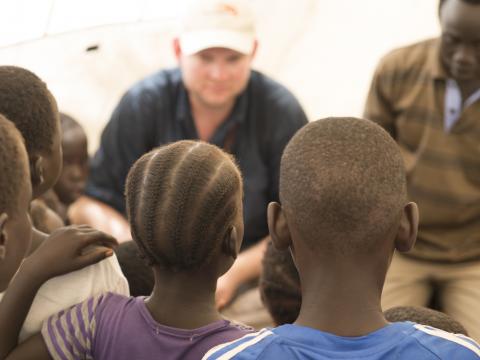What it means to be child focused in South Sudan

At 4:00 in the afternoon, sharing the floor and air with 20 children in the stagnant heat of a white tent, I asked them, “If you had the power to change anything, what would you change?” There was a pause, but then a boy at the back of the tent, his back resting against the wall, spoke up. He looked down as he replied, and he answered as if the question itself was absurd. The translation was precise, “We can change nothing. We have no power.” While the answer ignored the condition of my question, it has stuck in my mind as the mud from the streets of Malakal stuck to my boots.
For the past week I have been with a team from World Vision interviewing children in South Sudan. We have been asking them about their daily lives and the challenges and risks they face. Too often children’s voices are lost among the news of official peace talks and warnings of famine. In this environment, children know they have no power, and they feel they can’t do anything about it.
Some of the children said they had stories they wanted to tell but couldn’t.
In Juba, across from the airport and not far from new towering hotels, thousands of children are crammed into a pocket of exclusion, fearful to wander outside of the protected fence and afraid the tanks will return to crush them. They live in what is referred to as a PoC, or Protection of Civilians site. When the conflict started in December last year, the United Nations Mission opened the gates of its bases across the country to civilians fleeing violence. Out of fear, almost 100,000 people remain in the PoCs today. While they may be protected, the children say the camp feels like a prison.
In Malakal PoC, north of Juba, children who know violence and have been driven from their homes are now shopkeepers, wheelbarrow drivers and water bearers. Further north along the Nile in Kodok, children come to child friendly spaces to play with their friends so they can forget about what they have experienced outside. Some of the children said they had stories they wanted to tell but couldn’t.
Children have important things to say, but little power. At World Vision South Sudan we’re trying to shift this imbalance.
The children we’ve met have been uprooted from their homes and thrust into new realities of high density and distress. They remember home and want to return; they wait, hoping not to forget the path back.
More than fifty percent of South Sudan’s population is under 18-years-old. The international community is trying to protect these children, but few are listening to their voices. Children have important things to say, but little power. At World Vision South Sudan we’re trying to shift this imbalance and bring attention to the injustices these children constantly face. The starting point is acknowledging the children by listening to what they have to say.